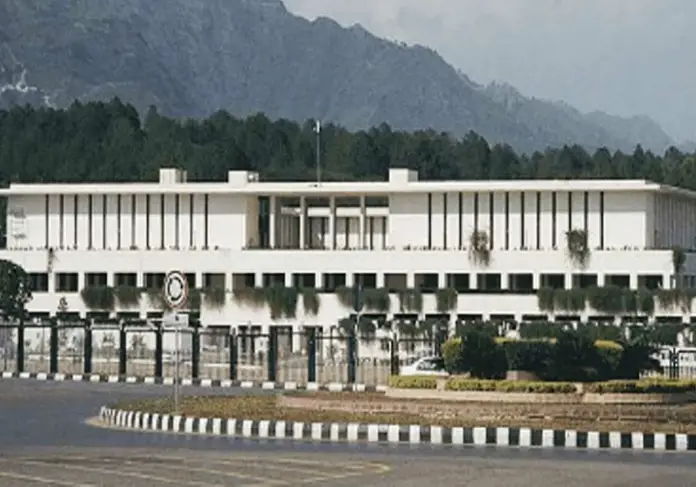During the recent meeting of the High Powered Selection Board (HPSB) led by PM Shehbaz Sharif’s government, only senior officers were promoted, while politically influential individuals were overlooked for promotion to Grade-22 positions.
This marks the first time in history that such a promotion process has taken place. The HPSB was convened following a court order, prompted by a challenge of last selection board from three officers – Ali Sher Mehsood, Inam Ghani, and Saeed Nawaz – who were not considered for promotion in board conducted by the Sharif government, alongside many others.
Political connections trump merit in Pakistan’s civil service promotions, alleged insiders. According to sources, the principal secretary to the prime minister, Dr Tauqir Shah, was one of several officials who received preferential treatment in promotions. Reports suggest many promoted officers were considered inefficient by their peers.
Under the Directory Retirement Policy 2020, Shah, among others, was expected to be in the line of fire. But instead, he was appointed principal secretary and convened the HPSB that handled promotions. He was, surprisingly, one of the aspirants whom he himself had then examined. Earlier, former PS Fawad Hasan Fawad had also sat in the driving seat. Following his retirement, Shah was rehired on contract, raising questions about the effectiveness of the policy.
Sources suggest that appointments of Grade-21 and Grade-22 officers have become a discretionary power of the prime minister. Reports indicate that political agenda and interests rather than qualifications or experience often govern these appointments. Critics argue that this undermines the merit-based system and compromises the country’s administrative capacity.
Despite being promoted to Grade-22, some officers such as Ismat Tahira, Azaz Aslam Dar, and Sara Saeed were not appointed as federal secretaries. In contrast, some Grade-21 officers with political connections were given the role of secretaries in charge. For instance, Rashid Mahmood Langrial was appointed as Secretary of the Power Division, Mohammed Mahmood as Secretary of Petroleum, and Momin Ali Agha as Secretary of Industries, all of whom were assigned to oversee crisis-hit sectors.
However, several Grade-22 officers were appointed to less desirable positions such as the Printing Corporation of Pakistan. This uneven distribution of appointments has raised concerns about the criteria used for promotions and appointments, particularly given that these top positions have significant responsibilities and are critical to the smooth functioning of the government.
Sources have indicated that posting decisions are typically influenced by political considerations rather than merit, resulting in an atmosphere of cronyism that undermines the principles of merit-based selection for top-level positions. As a consequence, officials with insufficient skill sets are often appointed to high-ranking positions, resulting in decreased management efficiency at the highest levels.
It is hoped that in the upcoming selection board, to be scheduled soon, a good number of politically connected officers will be considered for promotion. If the present political setup continues, as sources confide, other than Langrial, Agha, Mehmood, CS Punjab Zahid Akhtar Zaman, ex-CS Abdullah Sumbal, GB CS Mohyuddin Ahmad Wani, Asad Islam will be strong candidates.
The absence of clear criteria results in the lack of a standardized path for bureaucrats to be promoted. As a result, there is no objective measure of performance or merit, and promotions may be based on subjective qualities, such as the opinions of superiors or political leaders. Consequently, nepotism and cronyism can take precedence over a fair evaluation of qualification and performance, leading to an unfair and un-meritocratic promotion process.
According to an officer who spoke anonymously, Grade-22 is highly sought after by bureaucrats due to its status, pension benefits, and the potential to receive an additional residential plot. He lamented the HPSB ignored constitutional requirements. Although the issue of the lack of promotion criteria in the bureaucracy may appear minor in comparison to other challenges we face today, it is essential to address it if we desire to uphold equitable and just governance systems. Establishing clear promotion standards could ensure that civil servants are rewarded based on merit rather than nepotism and cronyism, resulting in a more equitable distribution of resources and increased diversity within government institutions. These improvements would ultimately benefit both citizens and society as a whole.
Continuing the practice of promoting bureaucrats based on connection will erode the reputation of the bureaucracy and cultivate incompetence as a desirable quality. This approach will stifle the growth of internal talent, leading to stagnation and a lack of dynamism in decision-making processes. It is crucial to implement greater accountability and transparency in promotion policies to ensure that only those who deserve recognition are rewarded. This will promote a culture of meritocracy, encouraging civil servants to strive for excellence and contribute to the development of our society. By valuing talent and promoting those with proven records of achievement, we can strengthen our government institutions and achieve greater success in governance.
In conclusion, when discretionary or arbitrary powers are used without sufficient justification or transparency, it can weaken the reputation of the bureaucracy and promote incompetence. This highlights the need for increased accountability and transparency in promotion policies, and bodies like the Supreme Court and public watchdogs may need to intervene to ensure that competent individuals are appointed based on their qualifications, skills, and experience rather than political affiliations. The implementation of orders such as the one in the Anita Turab case by the apex court can help in achieving this goal, and ensure that merit-based selection is upheld in high-level positions.







